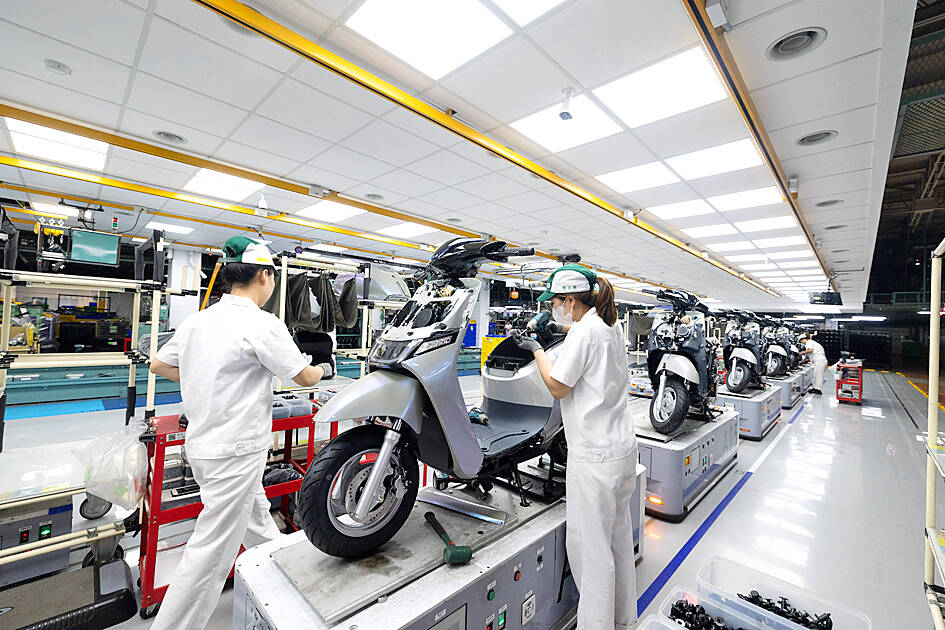Taiwan’s official manufacturing purchasing managers’ index (PMI) last month rose to 55.4, rebounding to expansion mode for the first time in 14 months, as firms rebuild inventory amid subdued uncertainty, the Chung-Hua Institution for Economic Research (CIER, 中華經濟研究院) said yesterday.
“The manufacturing industry reported business improvement in May, although uneven growth persisted,” CIER acting chairman Wang Jiann-chyuan (王健全) told a news conference in Taipei.
PMI data aim to gauge the health of the manufacturing industry, with values of 50 and higher suggesting expansion and scores lower than the neutral threshold suggesting a contraction.

Photo: CNA
It is the first expansion since May 2022 when Taiwanese manufacturers took a hit from a global slowdown induced by drastic inflation and monetary tightening.
The recovery came after the US and China put up decent economic showings with no new geopolitical tensions, Wang said.
That explained why the critical measures of new business orders and industrial output gained 13.7 and 10.9 points to 63.8 and 61 respectively, the monthly survey showed.
However, rush and short orders lingered, reflecting a conservative attitude among customers at home and abroad, Wang said.
Suppliers of electronics used in artificial intelligence products fared noticeably better than peers in other tech sectors, he said, adding that tech firms in general recover faster than non-tech companies, which remained weighed by weak demand and sharp competition.
The readings on inventory rose 2.1 points to 49.2, while customers’ inventory shed 1.8 points to 42.1, as they remained cautious, Wang said.
Sticky inflation in the US and the US Federal Reserve’s evasive stance on rate cuts lent support to that wariness, although firms grew more positive about their business prospects in the following months, the institute said.
The subindex on the six-month outlook rose 4.9 points to 60.1, its highest since April 2022, it said.
At the same time, the reading on raw material prices increased 2 points to 66.1, meaning that firms increasingly felt the pinch of price pressures.
The S&P Global Taiwan Manufacturing PMI, which was 50.9, arrived at a similar observation, finding that some manufacturers sought to protect their margin through a rise in output charges for the first time in five months.
The data on delivery time confirmed a recovery at 52.5, from 50.3 in April, as shipping container shortages and port congestions resurged due to conflict in the Red Sea, CIER said.
In related developments, nonmanufacturing companies also reported business improvements on the back of Mother’s Day celebrations, Wang said.
The nonmanufacturing index rose 0.1 points to 54.2, as service providers from almost all sectors registered positive cyclical movements, he said.
Nonmanufacturers reported positive views about their business, as evidenced by the six-month outlook, which rose 8.7 points to 63.6, the Taipei-based think tank said.
All sectors shared the optimism, thanks to the arrival of the high season for hospitality operators and TAIEX rallies that benefit financial service providers, it said.

France cannot afford to ignore the third credit-rating reduction in less than a year, French Minister of Finance Roland Lescure said. “Three agencies have downgraded us and we can’t ignore this cloud,” he told Franceinfo on Saturday, speaking just hours after S&P lowered his country’s credit rating to “A+” from “AA-” in an unscheduled move. “Fundamentally, it’s an additional cloud to a weather forecast that was already pretty gray. It’s a call for lucidity and responsibility,” he said, adding that this is “a call to be serious.” The credit assessor’s move means France has lost its double-A rating at two of the

AI BOOST: Although Taiwan’s reliance on Chinese rare earth elements is limited, it could face indirect impacts from supply issues and price volatility, an economist said DBS Bank Ltd (星展銀行) has sharply raised its forecast for Taiwan’s economic growth this year to 5.6 percent, citing stronger-than-expected exports and investment linked to artificial intelligence (AI), as it said that the current momentum could peak soon. The acceleration of the global AI race has fueled a surge in Taiwan’s AI-related capital spending and exports of information and communications technology (ICT) products, which have been key drivers of growth this year. “We have revised our GDP forecast for Taiwan upward to 5.6 percent from 4 percent, an upgrade that mainly reflects stronger-than-expected AI-related exports and investment in the third

Mercuries Life Insurance Co (三商美邦人壽) shares surged to a seven-month high this week after local media reported that E.Sun Financial Holding Co (玉山金控) had outbid CTBC Financial Holding Co (中信金控) in the financially strained insurer’s ongoing sale process. Shares of the mid-sized life insurer climbed 5.8 percent this week to NT$6.72, extending a nearly 18 percent rally over the past month, as investors bet on the likelihood of an impending takeover. The final round of bidding closed on Thursday, marking a critical step in the 32-year-old insurer’s search for a buyer after years of struggling to meet capital adequacy requirements. Local media reports

RARE EARTHS: The call between the US Treasury Secretary and his Chinese counterpart came as Washington sought to rally G7 partners in response to China’s export controls China and the US on Saturday agreed to conduct another round of trade negotiations in the coming week, as the world’s two biggest economies seek to avoid another damaging tit-for-tat tariff battle. Beijing last week announced sweeping controls on the critical rare earths industry, prompting US President Donald Trump to threaten 100 percent tariffs on imports from China in retaliation. Trump had also threatened to cancel his expected meeting with Chinese President Xi Jinping (習近平) in South Korea later this month on the sidelines of the APEC summit. In the latest indication of efforts to resolve their dispute, Chinese state media reported that